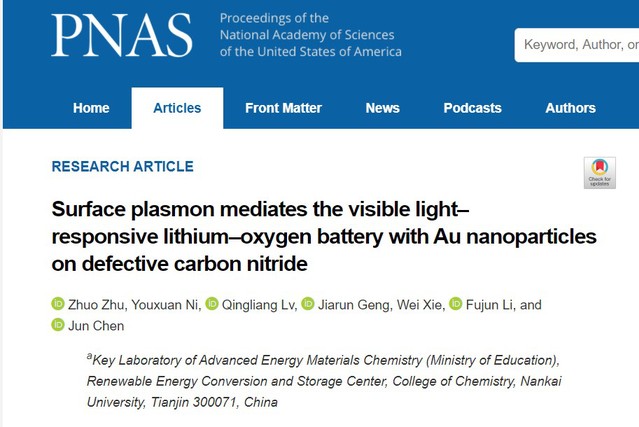A Research Team From Nankai University Has Made a Breakthrough in the Development of the Visible Light-Responsive Lithium-Oxygen Battery

In recent days, the research team of Li Fujun from the College of Chemistry of Nankai University has made a breakthrough in the development of light-responsive high-energy-density lithium-oxygen batteries. They have developed a new type of semiconductor catalyst with surface plasmon enhancement effect. For the first time, visible light has been introduced into the lithium-oxygen battery, which has significantly improved the positive electrode reaction kinetics and effectively reduced the polarization of the battery charge/discharge process. This strategy has developed a new idea for the construction of high-efficiency metal-air batteries. A few days ago, the paper introducing the work was published in the top international academic journal, Proceedings of the National Academy of Sciences (PNAS).

Fig. 1 The local surface plasmon effect of Au/Nv-C3C4 heterojunction and its involvement in the reaction process and electrochemical properties of lithium-oxygen batteries
Li Fujun’s team has been working on the new mechanism of lithium-oxygen batteries, applying semiconductor materials to light-responsive lithium-oxygen batteries and zinc-air batteries. After repeated experiments, they loaded gold nanoparticles onto nitrogen-deficient carbon nitride to prepare a gold/carbon nitride heterojunction, and then studied the local surface plasmon resonance effect of gold nanoparticles and the kinetics and mechanism of induced oxygen reductionand precipitation reaction.
Li Fujun said that this new breakthrough will be able to directly convert and store light energy in batteries and provide new strategies for solar power generation and storage.
Link to the paper: https://www.pnas.org/content/118/17/e2024619118
(Reported by Junhui Wu, translated by Dongze Wu, edited by Daniel Stefan and JianjingYun)









